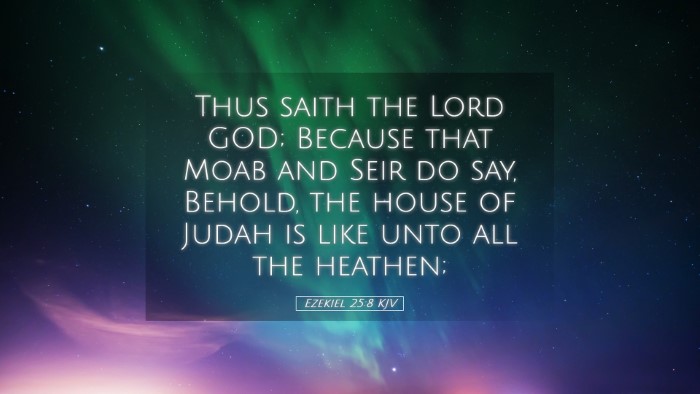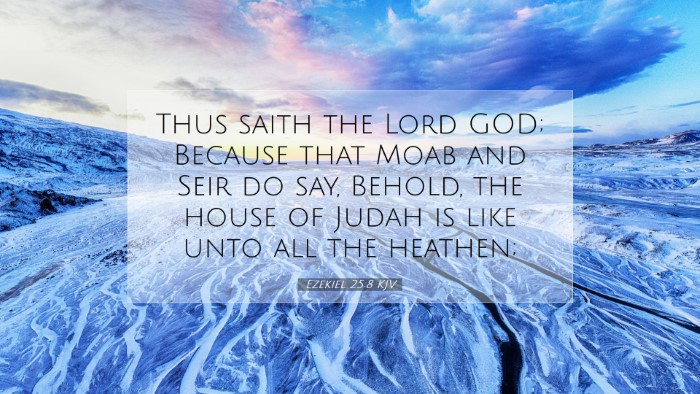Ezekiel 25:8 Commentary
Verse Context: Ezekiel 25:8 states: "Thus says the Lord God: 'Because Moab and Seir said, "Look! The house of Judah is like all the nations!"'
Introduction
This verse emerges within the broader context of prophetic declarations against various nations surrounding Israel, particularly focusing on Moab. It reflects God's displeasure not just with the actions of these nations but also with their attitudes towards His chosen people, Judah. The universal theme of God’s sovereignty and judgment reverberates throughout this passage.
Historical Background
Moab, located to the east of Israel, represents a nation historically embroiled in conflict with Israel. Their disdain towards Judah reflects a longstanding enmity, traced back to the narratives in Numbers 22 and 2 Kings 3, where Moab’s animosity can be seen in their attempts to undermine Israel.
Theological Insights
- Divine Judgment and Sovereignty: The passage underscores God's sovereignty over all nations. By declaring judgment upon Moab, God reaffirmed His authority not just over Israel, but over the surrounding nations that exhibited contempt towards His people.
- Unity of God’s People: Judah's identity as "the house of Judah" emphasizes God’s covenant relationship with His people. The attitude of Moab, which equates Judah with other nations, demonstrates a failure to recognize this divine distinction.
Commentary Excerpts
Matthew Henry
Henry asserts that Moab's scornful remarks about Judah reveal a lack of recognition of Judah's special relationship with God. He emphasizes that when nations forget divine truth, they become instruments of judgment and decay. This reflection serves as a solemn warning against the pride and arrogance that often accompany forgetfulness of God’s law.
Albert Barnes
Barnes highlights that God’s pronouncement against Moab is a reminder of the consequences of arrogance and disdain towards God's people. He notes how the statement of Moab reflects a broader ignorance of God's hand in history. Moreover, Barnes points to the necessity for nations to grasp the reality of being under God's governance.
Adam Clarke
Clarke draws attention to the socio-political implications of the relationship between Moab and Judah. He underscores that such enmity not only draws forth divine wrath but also serves as a reminder of God’s providence in protecting His people. Clarke calls for an examination of the heart of nations and warns against the folly of belittling others while ignoring one's own standing before God.
Lessons for Today
The message of Ezekiel 25:8 extends beyond its historical context and invites modern believers, pastors, and theologians to reflect on the nature of contempt and judgment within the framework of their understanding of God's chosen people. Some critical lessons include:
- Recognizing God's People: Believers are called to respect and honor God's chosen individuals and communities, understanding their special place within divine history.
- The Danger of Arrogance: The attitude of Moab warns against arrogance, which not only leads one away from God's truth but also subjects one to spiritual and sometimes physical calamities.
- Understanding Divine Judgment: Just as Moab faced judgment for their attitudes, modern nations and individuals must reckon with the seriousness of how they respond to God's people and His revelations.
Conclusion
Ezekiel 25:8 serves as a potent reminder of God’s sovereignty and the serious consequences that arise from contempt towards His people. The insights gleaned from Henry, Barnes, and Clarke invite deeper reflection on our attitudes toward God’s chosen and challenge us to uphold a reverent heart before the Lord. As scholars, pastors, and faithful followers of Christ, it is imperative to heed the warnings of scripture and foster an understanding that aligns with God's will.


